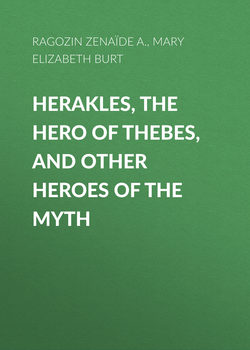Читать книгу Herakles, the Hero of Thebes, and Other Heroes of the Myth - Ragozin Zenaïde A., Zénaïde Ragozin - Страница 8
CHAPTER VI
THE FOURTH LABOR – THE ERYMANTHIAN BOAR
ОглавлениеElis is a beautiful plain lying to the north and west of Arcadia. Here once in five years there was a great festival in honor of Zeus, when all the men and boys ran races, wrestled, boxed and played all sorts of games. Between Arcadia and Elis there is a high mountain-range, called Erymanthos. There a terrible Boar had its lair.
The Boar frequently left its den and came down into the plains and killed cattle, destroyed fields of grain and attacked people. Eurystheus, having heard of this Boar, made up his mind that he wanted the beast alive, and so ordered Herakles to bring it to him.
The hero put on his lion skin once more and started for the mountain. On his way he stopped at a little town where the Centaurs had their home. These strange people were half man and half horse. We have heard that they were really men, but such good riders that they seemed to be one with their mountain ponies.
Their home was just on the edge of a high plain, covered with oak-trees and looking down across a wild valley, through which flowed the Erymanthos River. There were many forests and little streams and dreadful gorges in the valley, where these horsemen used to hunt and fish.
The Centaur Chief, Pholos, received Herakles as a guest and gave him cooked meat to eat, while he ate it raw himself, after the Centaurs’ custom.
When Herakles had eaten his fill, he said to Pholos: “Thy food is indeed good and tasteful. But I should enjoy it still more if I could have a sip of wine, for I am very thirsty.” To which Pholos replied: “My dear guest, we have very fine and fragrant wine in this mountain, and I should like nothing better than to give thee some of it. But I am afraid to do so, because it has a strong aroma, and the other Centaurs, if they smelt it, might come to my cave and want some. They are very fierce and lawless, and might do thee great harm.”
“Let not that trouble thee,” said Herakles. “I am not afraid of the Centaurs.” So the wine was placed before him and he drank of it. In a little while a great noise was heard outside of the cave, a shouting of many wild voices and a stamping of many horses’ feet. What Pholos feared had come to pass.
The Centaurs had smelt the fragrance of the wine and in full armor had made for the cave of Pholos. Then began a terrible fight. The Centaurs fell upon Herakles with pine-branches, rocks, axes, and fire-brands, and the clouds, their mothers, poured a flood of water on him. But Herakles was too clever for them. He put two to flight, prevented others from entering the cave, and shot the rest down with his arrows.
Pholos was a kind-hearted chief, and hearing one of the Centaurs crying for help outside of his cave, went out to him and tried to pull the arrow from his wound, wondering at the same time that so slight a weapon could cause his death. But the arrow slipped out of his hand and struck his own foot. It made only a scratch, but it could not be healed, for the arrow was one of those which Herakles had dipped in the blood of the Hydra, and poor Pholos breathed his last.
The death of his kind host was a great sorrow to Herakles, for in those times, when there was so little safety in travelling, the bond of kindness and gratitude between host and guest was one of the closest and most sacred, often more so than that between members of the same family. In all their later lives, host and guest could never meet as enemies, and if the chances of war brought them face to face as foes, they were not expected to fight. They exchanged greetings and gifts and drove off in different directions.
Herakles therefore sincerely mourned his friend, performed over him the proper funeral rites, and buried him with all due honors in the side of the mountain. There he left him, sore at heart, but comforted by knowing that he had done all he could do to reconcile the shade of Pholos, and that his soul would bear him no grudge in Spirit Land.
Then Herakles went on his way in search of the Boar. He soon spied him in a dense thicket and chased him to the very top of the mountain. The mountain-top was covered with deep snow, which prevented the Boar from running fast enough to escape. So Herakles ran up to him, caught him in a net, threw him over his shoulder and carried him off alive to Mykenæ.
It is said that Eurystheus hid himself in a large brazen bowl when he heard Herakles approaching the city, and that Herakles threw the Boar into the same brazen bowl as the safest place in which to keep him. How astonished Eurystheus must have been to find himself in such terrible company! And we can fancy that he scrambled out with all possible haste.
